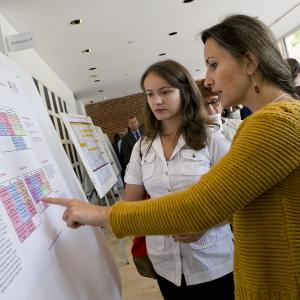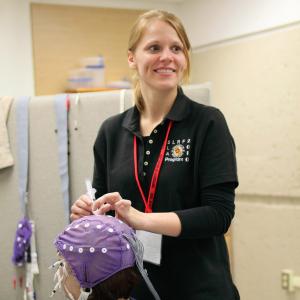SLA seminar: Kathy Conklin (U of Nottingham)
For an invite to the online talk, email ttytko@umd.edu.
The importance of (good) input for formulaic language learning and processing
Abstract: "Garbage in, garbage out" is a well known saying in Computer Science, expressing the fact that poor quality input leads to poor quality output. This sentiment is relevant to second language learning and usage-based approaches that put a premium on the linguistic input that learners receive. Such models predict that the words and sequences of words that are encountered frequently by learners become entrenched in memory. As much as half of discourse is made up of formulaic language or multi-word units—in other words, we tend to say things in the same way ('food and drink' not 'drink and food'). Second language learners need to acquire these sequences in order to achieve native-like performance. Despite the prevalence of formulaic language, relatively little is known about how it is learned. The focus of this talk will be on the learning–or entrenchment in memory–of formulaic language. We will look at the relationship between learners’ input and subsequent processing. We will see that even very low-level, beginner secondary school students are sensitive to the input they receive from teaching materials, a finding that has important implications for teaching and material design.
Bio: Kathy Conklin is Professor of Psycholinguistics in Centre for Research in Applied Linguistics, in the School of English at the University of Nottingham. Her research focuses on: 1. the learning, representation and processing of multi-word units (e.g. "bread and butter") in a first (L1) and second (L2) language; 2. implicit and explicit L2 word learning and multi-word sequence learning; and 3. automatic word activation in an L1/L2. Much of her research makes use of eye-tracking to study second language learning and processing, which is the focus of her book An introduction to eye-tracking: A guide for applied linguistics research (with Ana Pellicer-Sánchez and Gareth Carrol, 2018, Cambridge University Press)
Readings
Conklin, K. & Carrol, G. (2020). Words go together like “bread and butter”: The rapid, automatic learning of lexical patterns. Applied Linguistics. Online First, 1-23. [DOI: 10.1093/applin/amaa034]
Northbrook, J. & Conklin, K. (2019). Is what you put in what you get out? —Textbook-derived lexical bundle processing in beginner English learners. Applied Linguistics, 40(5), 816-833. [DOI: 10.1093/ applin/amy027]












